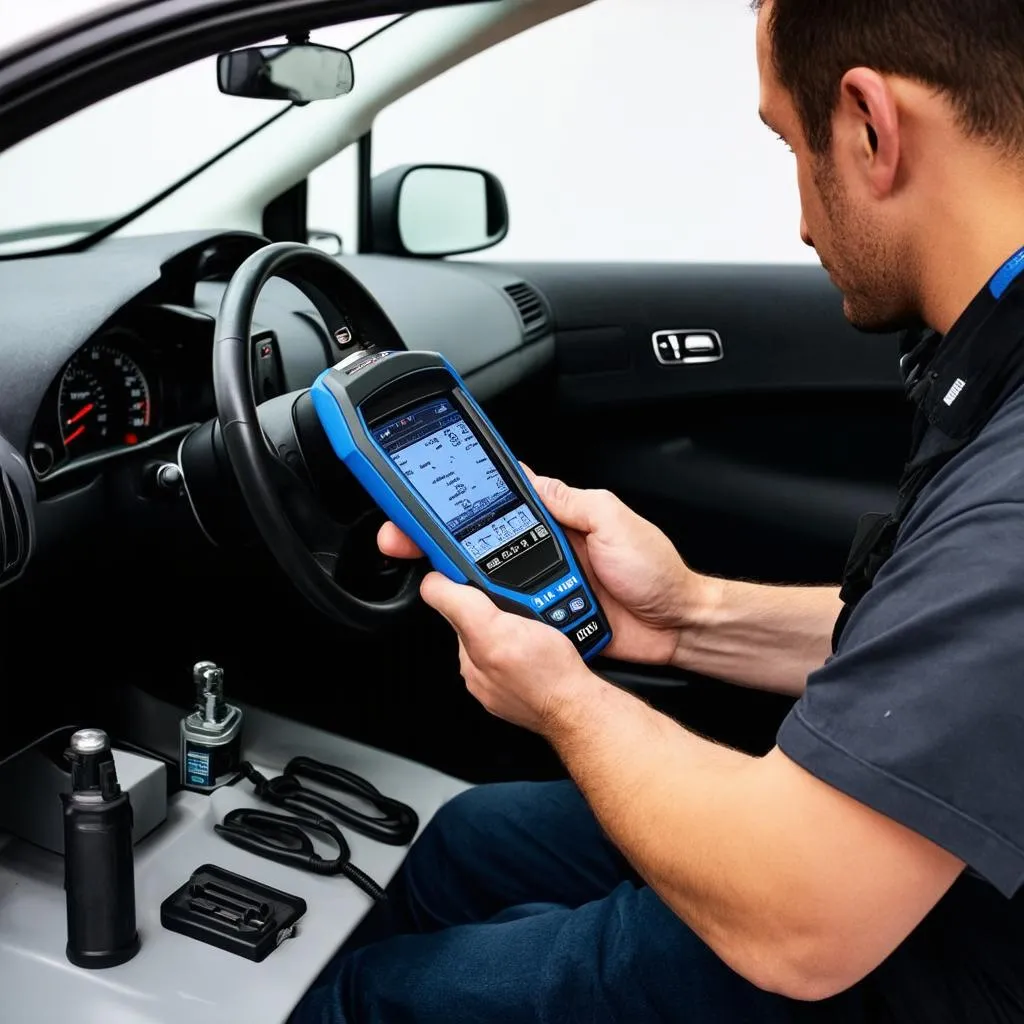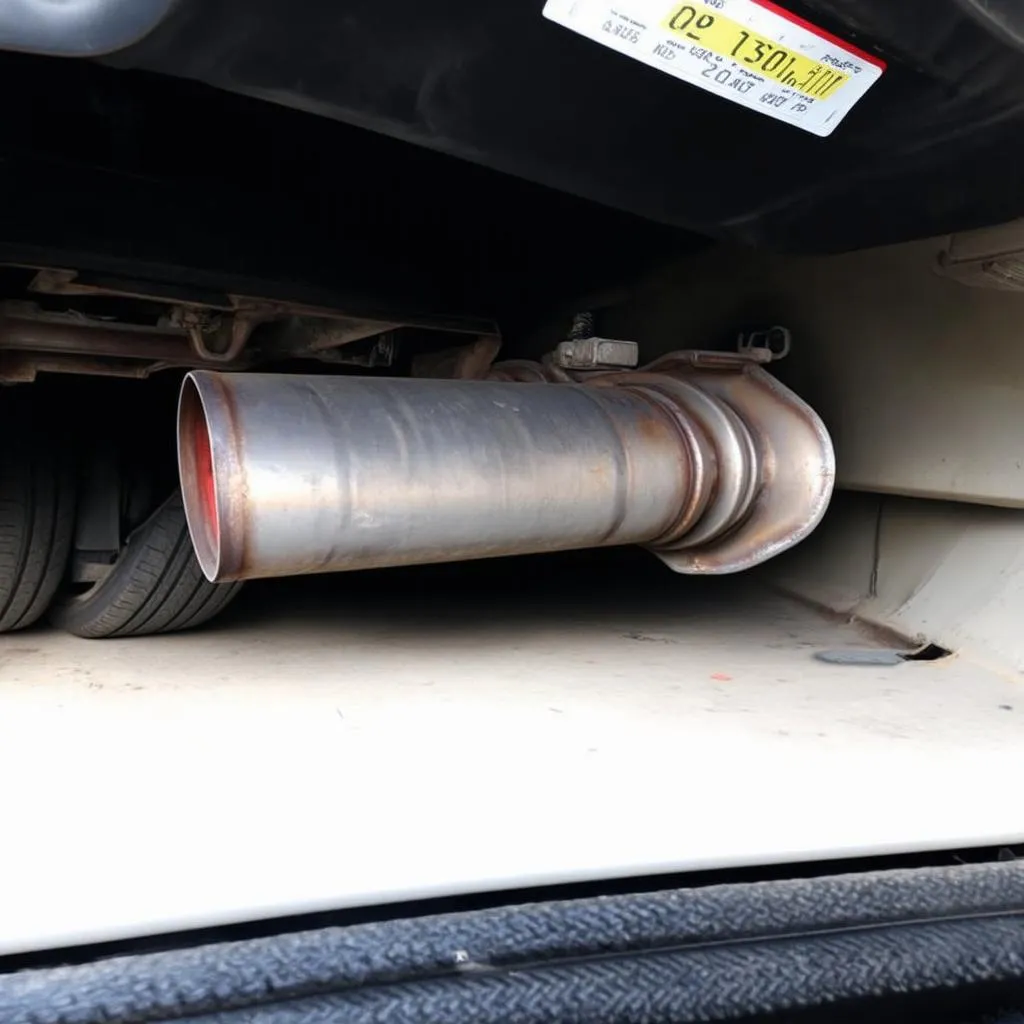Ever been in a situation where your car fails an emissions test, leaving you scratching your head and wondering what went wrong? You’re not alone! This is a common experience for many car owners, especially when dealing with complex European vehicles. The culprit often lies in a cryptic code lurking within the car’s OBD (On-Board Diagnostics) system.
The Mystery Behind OBD Emission Test Fail Codes:
The OBD system is essentially your car’s internal health monitor. It constantly tracks vital functions like engine performance, fuel consumption, and emissions. When things go awry, the system generates error codes, often denoted by a flashing “check engine” light. These codes are like secret messages whispering about the car’s woes.
Imagine this: You’re driving down a winding road, enjoying the scenery. Suddenly, your car sputters and coughs, the “check engine” light flickers ominously. You pull over, fearing the worst. You’re not sure what’s going on, but you know something is amiss. This, my friends, is the feeling many experience when confronted with an OBD emission test fail code.
Decoding the Secrets:
These OBD codes are not just random numbers. They are carefully constructed messages offering valuable insight into the problem. Each code corresponds to a specific component or system within the car. Understanding these codes is the first step to tackling the issue.
For example, a code like “P0420” might indicate a problem with the catalytic converter. This crucial component reduces harmful emissions, so a malfunction can lead to an emission test fail.
Diving Deeper:
What Do Emission Test Fail Codes Mean?
The emission test is a crucial part of vehicle safety and environmental protection. It ensures your car isn’t spewing harmful pollutants into the air. When your car fails this test, it means the emission levels are exceeding the acceptable limits.
Why Do OBD Codes Cause Emission Test Fail?
There are numerous reasons why you might encounter OBD codes that lead to an emissions test fail:
- Catalytic Converter Issues: A faulty catalytic converter can significantly impact your car’s emissions.
- Oxygen Sensor Malfunction: Oxygen sensors are crucial for monitoring and adjusting fuel-air mixture. Problems with these sensors can directly impact emissions.
- Evaporative Emission System Leak: A leak in this system can allow fuel vapors to escape, causing a failure.
- Engine Misfire: An engine misfire can result in unburned fuel being released, affecting emissions.
- Mass Airflow Sensor Error: This sensor measures the amount of air entering the engine. A faulty sensor can disrupt the fuel-air ratio and emissions.
Common Emission Test Fail Codes & Their Meanings:
P0420: This code, as mentioned earlier, signifies a problem with the catalytic converter.
P0171: This code suggests a lean condition, meaning the engine has too much air and not enough fuel.
P0174: This code points towards a rich condition, meaning the engine has too much fuel and not enough air.
P0300: This code indicates a random/multiple cylinder misfire.
P0440: This code signals a problem with the evaporative emission system.
Navigating the Labyrinth:
Here are some helpful tips for deciphering and troubleshooting OBD emission test fail codes:
-
Diagnose the Code: Use an OBD2 scanner to retrieve the specific code. This tool acts as a translator, converting the cryptic code into understandable language.
-
Research the Code: Once you have the code, search online or consult a reputable repair manual to understand the underlying issue.
-
Inspect the System: Based on the code and your research, you can visually inspect the associated components for signs of damage or wear.
-
Test Components: Use a multimeter to test sensors or other components for proper functionality.
-
Seek Professional Assistance: If the problem seems complex or beyond your expertise, it’s best to consult a qualified mechanic specializing in European vehicles.
The Spiritual Connection:
While not directly related to the technical aspects of OBD emission test fail codes, there’s a certain spiritual connection to the care and maintenance of our vehicles. Just like we take care of our bodies and minds, we should nurture our cars, ensuring they operate smoothly and efficiently. Perhaps it’s a reminder to be mindful of our impact on the environment and the interconnectedness of all things.
Questions, Concerns, & Solutions:
Q: Can I clear the code myself and pass the emissions test?
A: While clearing the code might temporarily mask the issue, it’s crucial to address the underlying problem to ensure long-term vehicle health and prevent future test failures.
Q: What are some common causes of emissions test fail for European cars?
A: European vehicles, with their sophisticated engines and emission control systems, are often more susceptible to issues that can lead to emission test failures. Faulty catalytic converters, oxygen sensor malfunctions, and issues with the evaporative emission system are common culprits.
Q: What tools or resources can help me troubleshoot these codes?
A: Dealer-level scanners specifically designed for European vehicles provide comprehensive diagnostics and access to advanced features that are often not available in basic OBD2 scanners. These scanners allow you to delve deeper into the vehicle’s systems, identify hidden issues, and resolve problems effectively.
Q: Where can I find reputable resources for learning more about OBD codes and diagnostics?
A: The internet is a treasure trove of information, but finding reliable resources can be challenging. Look for reputable websites and forums dedicated to automotive repair and diagnostics, particularly those focused on European vehicles. You can also consult repair manuals, online courses, or professional training materials.
Your Pathway to a Smooth Ride:
Don’t let those cryptic OBD codes send you into a tailspin! With a little knowledge and the right tools, you can confidently tackle the challenges of an emissions test fail and keep your European car running smoothly.
 obd scanner for european cars
obd scanner for european cars
 emissions test failure
emissions test failure
Remember, if you need expert assistance with diagnostics, code reading, or repair, don’t hesitate to contact our team at techcarusa.com. Our team of experienced mechanics is available 24/7 to provide support and guidance. Reach out to us via Whatsapp: +84767531508.
Let us know your thoughts in the comments below! And be sure to explore other valuable articles on our website for more insights into the world of European car maintenance and repair.
